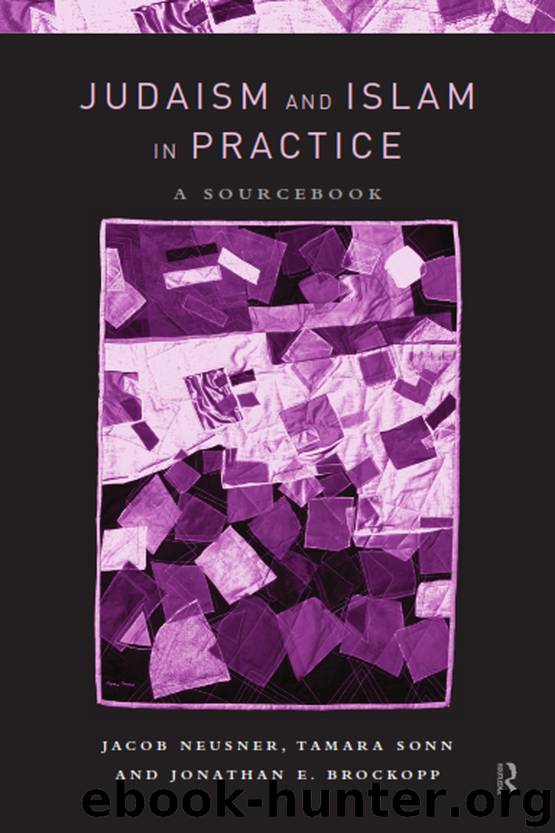Judaism and Islam in Practice by Brockopp Jonathan E.; Neusner Jacob; Sonn Tamara

Author:Brockopp, Jonathan E.; Neusner, Jacob; Sonn, Tamara
Language: eng
Format: epub
Publisher: Routledge
9 DIVORCE IN ISLAM
Divorce in Islam has no stamp of sin, as in Christianity, and it is deceptively easy for the man to achieve. All that is required is for him to make three pronouncements of divorce to his wife, and unlike Jewish law, these may be spoken. Divorce, however, has specific legal effects which can make the matter more difficult, and in regulating divorce, Islamic law seeks to ensure that women and children are not left without support.
A statement of divorce [talaq, lit. setting free] said three times in a single sentence goes against tradition, but if it occurs, it has legal effect. The traditional form of divorce is an indifferent act [neither recommended nor reprehensible] and it is as follows. The man issues a single statement of divorce to his wife while she is in a state of purity [between menstrual periods], during which he has not come near her. The final statement of divorce does not follow until she has completed the waiting period; during this period he has the right to retract his statement of divorce: as for free women who menstruate, this is as long as the third menstrual cycle after divorce does not begin; for slaves it is the second period. If she is one of those who do not menstruate, or one who has already gone into menopause, he divorces her whenever he wants. The same applies to the pregnant woman. The pregnant woman he may ask to return to him as long as she has not given birth; the woman undergoing a waiting period may be asked to return during the months in which her waiting period has not yet been completed.38
Although the pronouncement of divorce may be oral, it must be spoken three times. Preferably the husband makes one or two pronouncements, the wife undergoes her waiting period, and then he completes the remaining pronouncements. The waiting period is defined in the Qur'an as three menstrual cycles and is established for the purposes of ensuring that a divorced woman is not with child, and that if she is pregnant, the paternity of that child is known and mother and child are properly cared for. These and other rules are covered extensively in the Qur'an.
Those who take an oath to stay away from their women have a wait of four months. If they revert, God is forgiving, compassionate.
If they decide to divorce, God is hearing, knowing.
Divorcées shall wait by themselves for three menstrual cycles. They are not allowed to hide that which God has created in their wombs, if they believe in God and the last day. In this their husbands have the right to make them return, if they wish restoration. Women have rights placed upon them by honor, but men have a degree over them; God is almighty, wise.
Divorce is two times; thereafter is either honorable retention or setting free respectfully. You are not allowed to take anything of what you have given your wives, unless the two are afraid that they will not stay within God's boundaries.
Download
This site does not store any files on its server. We only index and link to content provided by other sites. Please contact the content providers to delete copyright contents if any and email us, we'll remove relevant links or contents immediately.
| Hebrew Bible (Old Testament) | Talmud |
| Torah | Zohar |
The Power of Habit by Charles Duhigg(3141)
Man's Search for Meaning by Viktor E. Frankl(2674)
Mckeown, Greg - Essentialism: The Disciplined Pursuit of Less by Mckeown Greg(2443)
MOSES THE EGYPTIAN by Jan Assmann(2417)
Devil, The by Almond Philip C(2333)
The Complete Dead Sea Scrolls in English (7th Edition) (Penguin Classics) by Geza Vermes(2283)
Unbound by Arlene Stein(2277)
I Capture the Castle by Dodie Smith(2039)
Schindler's Ark by Thomas Keneally(1890)
The Invisible Wall by Harry Bernstein(1808)
The Gnostic Gospel of St. Thomas by Tau Malachi(1799)
The Bible Doesn't Say That by Dr. Joel M. Hoffman(1682)
The Secret Doctrine of the Kabbalah by Leonora Leet(1612)
Political Theology by Carl Schmitt(1586)
The Jewish State by Theodor Herzl(1536)
A History of the Jews by Max I. Dimont(1533)
The Dead Sea Scrolls Bible by Martin G. Abegg(1519)
The Book of Separation by Tova Mirvis(1491)
Oy!: The Ultimate Book of Jewish Jokes by David Minkoff(1375)
